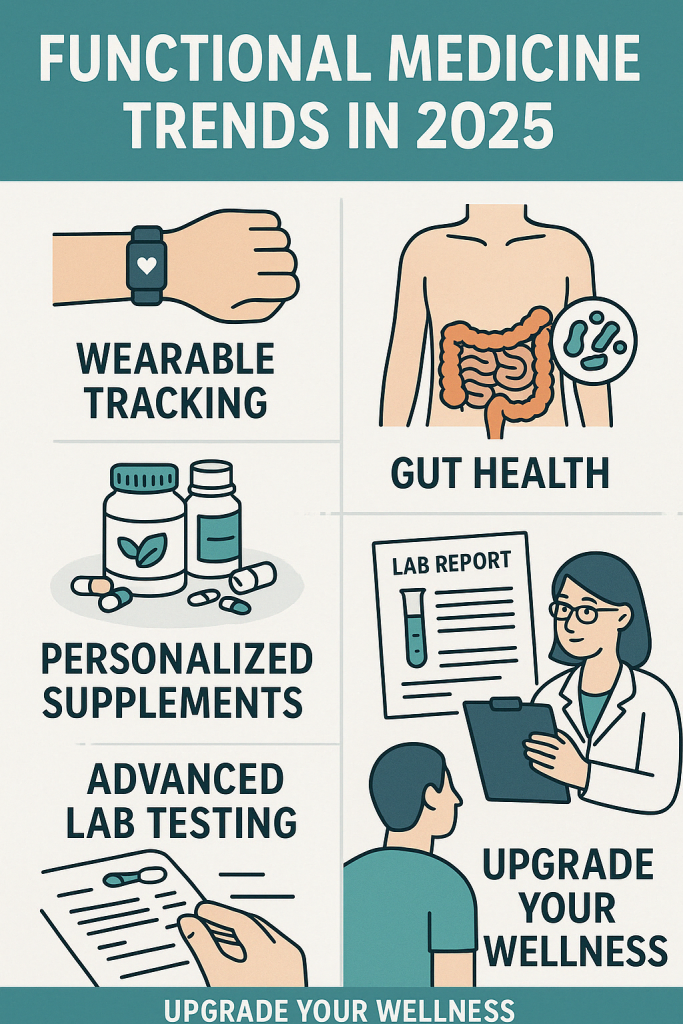🧠 What Is Functional Medicine—and Why Is It Trending in 2025?
Functional medicine is a personalized, systems-based approach that addresses the root causes of disease—not just symptoms. In 2025, it’s moving from fringe to mainstream, blending conventional diagnostics with nutrition, genetics, gut health, and lifestyle data.
A 2024 market report by GlobalData revealed that 45% of U.S. adults prefer functional medicine approaches for chronic conditions. So what’s driving this shift? Let’s dive in.
✅ 10 Proven Tips to Align with the 2025 Functional Medicine Trend

1. Start with a Full-Panel Root Cause Test
Why it matters: Functional practitioners don’t just run standard tests—they go deeper with hormone panels, microbiome mapping, and food sensitivity testing.
Pros: High personalization
Cons: Can be costly without insurance
Real Case: Jane, a 42-year-old with chronic fatigue, discovered a mold toxicity issue via organic acid testing—something missed in traditional labs.
2. Optimize Your Gut-Brain Axis
Why it matters: 70% of your immune system and 90% of your serotonin is produced in your gut.
Tips:
- Eat fermented foods
- Use a personalized probiotic (post-stool test)
- Avoid processed “gut-disrupting” foods like artificial sweeteners
3. Shift from “Calories” to “Information” in Food
Food is no longer just energy—it’s biochemical information.
- Choose phytonutrient-rich foods like turmeric, blueberries, and cruciferous vegetables
- Follow an anti-inflammatory diet, such as the IFM Elimination Diet
4. Track Your Health Metrics with Wearables
Examples: WHOOP, Oura Ring, BioStrap
Metrics Monitored:
- HRV (Heart Rate Variability)
- Sleep stages
- Stress response
Actionable Tip: Use these data points in consultation with your functional provider to adjust supplements, workouts, or diet.
5. Integrate Mind-Body Modalities
Popular Practices (2025 trend):
- Breathwork
- Somatic therapy
- HeartMath (biofeedback)
Pros: Improves cortisol regulation
Cons: Results require consistency and expert guidance
6. Rethink Your Supplement Stack
Don’t go generic. Functional practitioners now use genomic data to tailor supplement protocols.
Trending Supplements in 2025:
| Supplement | Purpose | Trend Note |
|---|---|---|
| Berberine | Blood sugar control | Natural alternative to metformin |
| PQQ | Mitochondrial health | Anti-aging support |
| Magnesium L-threonate | Cognitive support | Popular in burnout recovery |
7. Balance Your Nervous System (Not Just Your Blood Work)
Chronic stress = chronic illness.
Try vagal toning exercises, cold plunges, or craniosacral therapy to calm your autonomic nervous system.
8. Use a Health Coach for Accountability
Why it matters: Data is meaningless without consistent action.
Functional coaches support sleep routines, nutritional plans, and emotional processing.
Pro Tip: Ask your practitioner if they partner with FMCA-certified coaches.
9. Detox is Back—but with Science
Forget juice cleanses. Functional detox in 2025 means:
- Sauna therapy (infrared)
- Liver support nutrients (e.g. milk thistle, NAC)
- Binders for heavy metals (like activated charcoal or zeolite)
Caution: Always detox under practitioner guidance.
10. Ask About Your Biological Age
Chronological age is out—epigenetic clocks now measure your actual body’s aging.
Request a TruDiagnostic or GlycanAge test to get insight and reverse biological age with lifestyle tweaks.
❓ 9 Common Questions About Functional Medicine (FAQ)
1. What is functional medicine in simple terms?
A holistic approach that treats the root cause of health issues, not just symptoms.
2. Is functional medicine evidence-based?
Yes, it combines lab diagnostics and peer-reviewed nutritional and genomic science.
3. How is it different from integrative medicine?
Integrative combines traditional & alternative therapies; functional digs deep into root mechanisms using data.
4. Is it covered by insurance?
Some tests and visits are; others (like advanced labs) are often out-of-pocket.
5. Can it help with autoimmune diseases?
Yes—many protocols focus on gut healing, anti-inflammatory diets, and lifestyle changes.
6. What are some red flags when choosing a provider?
Be cautious of anyone who pushes unnecessary supplements or avoids diagnostic testing.
7. How do I find a certified functional practitioner?
Check ifm.org or a4m.com directories.
8. Can I do functional medicine at home?
You can start with lifestyle changes, but true functional medicine works best with expert guidance.
9. What’s the cost of getting started?
Initial consultations + testing range from $300–$1000+, depending on complexity.
✅ Final Takeaway
The latest trends in functional medicine are grounded in personalization, real data, and preventive action. Whether you’re looking to fight fatigue, balance hormones, or just feel younger—you don’t need a massive overhaul. Start with one step from these 10 proven strategies and see how your body responds.
📌 Action Step: Book a consultation with a certified functional medicine provider and request a root-cause health panel.

